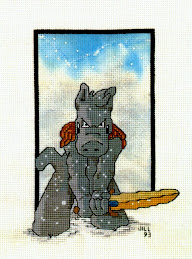
Onwards with the challenge! John Crowley is the last of the C's.
I should have liked Little, Big. It was a sprawling family saga about quirky people in upstate New York, who have genuine fairies living on their estate.
The alarm bells started early on when I read that Little, Big inspired Mark Helprin to write Winter's Tale. Winter's Tale remains one of the most boring, pointless books I have ever had the misfortune to open the covers of. By the time I'd read the first chapter of Little, Big, my fears were confirmed.
There's probably not a bad story in this book, but it's author; John Crowley, chose to bury it under bloated paragraphs of overblown prose and reams of nonsensical chatter from his main characters. It's been praised and acclaimed. I found it barely readable.
The story, such as it is, concerns the extended Drinkwater family, from the time Violet Bramble marries John Drinkwater and moves from England to America, somehow bringing the fairies that have been part of the Brambles for some time, with her to the New World. The generations are briefly described and covered, most of the story concerns the inoffensive Smoky Barnable and his marriage into the Drinkwater family by marrying Daily Alice Drinkwater. The Drinkwater family seems to decline from that point on. There's a sub plot involving the awoken Holy Roman Emperor Frederick Barbarossa, now calling himself Russell Augenblick, his election to the office of United States President and the dictatorship that followed, this subplot also introduced the Drinkwater's powerful clairvoyant cousin; Ariel Hawksquill. That whole subplot seemed entirely out of place and probably could have been moved into it's own book.
In all it's 538 pages I only found two passages believable and effective. The slow decline of the Drinkwater family and their unusual house falling into disrepair as Smoky and Alice's offspring seemed to lose their belief in the occasionally malevolent fairies that had overseen the families destiny for over a century. The other passage was Auberon Barnable's descent into alcoholism, although he did recover, that I found one of the more unbelievable parts of the book.
It's always nice to see a writer who knows how to use words and John Crowley certainly knows lots of words, in fact he seemed to think it was a cardinal sin to use the same word twice or use only one word where twenty would easily suffice. By about chapter 3 (Old Law Farm) I was wishing I could confiscate his thesaurus. Then there was the way his main characters spoke and acted. Maybe I don't have enough life experience, but I've never met or heard of anyone who actually talks and acts the way his characters did. Possibly that's the point, but as a reader I like to be able to identify in some small way with the characters and I couldn't do that with any of the rather unusually named characters that peopled the pages of Little, Big.
I'm actually kind of proud of myself for making it through this book with turning it into a 'wallbanger' (that's a book you fling across the room in disgust to smack against the nearest wall).
If anyone really wanted to read something in a similar vein, they could try Mark Helprin's Winter's Tale, but I'd only do that as a cure for insomnia. Martin Millar's The Good Fairies of New York has a similar theme of Old World fairies finding themselves interacting with the inhabitants of the United States, it's also a lot shorter and far more entertaining. Raymond Feist's Faerie Tale is another story of Old World faeries in modern day East Coast America, it's a rather Stephen Kingish thriller, but is often well thought of these days and it's an interesting departure from the author's Tolkienesque high fantasy.


No comments:
Post a Comment